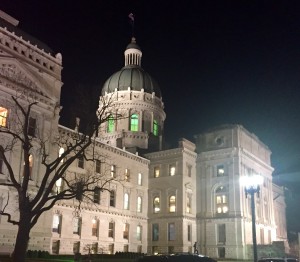What Made It Through The First Half Of The Legislative Session?

The legislature continues to discuss education bills during the 2016 legislative session. (photo credit: Claire McInerny/StateImpact Indiana).
This week marked the halfway point for the 2016 General Assembly – when the house and senate pass their original bills and then switch, passing them to the other house. Following are the education bills that made it through the first half and moved to the opposite chamber.
[Check out our database of all education legislation, updated every week.]
The following bills were passed by the House and now go to the Senate for consideration:
Recruiting New Teachers
HB 1002 would create a scholarship for college students who want to be teachers, giving them $7,500 a year in tuition if they commit to teaching in the state for five years after graduation. After passing the House it went immediately to the Senate Appropriations committee. This bill had almost unanimous support in the House, passing through 96-1.
Teacher Salaries
HB 1004 would allow local school corporations to increase the salary of a teacher without consulting the teacher’s union, if the school district is trying put a teacher in a hard to fill spot (Special Ed, STEM classes, rural or urban schools). Unions and teachers have pushed back on this bill. It passed through the House narrowly, and representatives did not vote along party lines.
Teacher Raises
If passed, HB 1005 would increase pay for teachers rated effective, and it also makes teachers with lower ratings but in their first two years of teaching eligible for raises.
Diplomas
HB 1219 would require every high school to offer all diploma options approved by the State Board of Education. The SBOE is currently in the process of re-writing the diploma options for Indiana’s high school students, and under the current model schools choose which diploma type they offer. This bill would change that, giving every student the same option.
Future of ISTEP
HB 1395 gives the SBOE the authority to hire a third party vendor to rescore the 2015 ISTEP+ tests. This bill also would create a 24 person panel of educators, legislators and community members that would be charged with looking at the current assessment and make a plan for creating a new test.
The following are Senate education bills that now sit in the House:
Charter School Collection Data
SB 9 says charter schools don’t have to report the following information to the Department of Education: the number of students enrolled in their school, the name and address of each student, where the student transferred from or the student’s grade. The bill passed unanimously through the Senate.
Teacher Pay
SB 10 allows for teacher raises if the teachers has a master’s degree in the content area directly related to a dual credit course or a subject taught by the teacher. Teacher’s unions are not in favor of this bill because these raises are granted outside of the collective bargaining agreement. This narrowly passed through the Senate with a 26-24 vote.
ISTEP Panel
Similar to language in HB 1395, SB 63 creates a panel of educators and lawmakers to examine alternations to the state assessment and generate report on their findings. Unanimously passed through the Senate.
Cursive Writing
SB 73 would require every school corporation to include cursive writing in its curriculum. Cursive writing bills have been introduced the past few years but never made it to the governor’s desk.
Various Education Matters
Among other things, SB 93 allows for an individual with a teaching license in another state to teach in Indiana without completing additional requirements. It also requires any test vendor that administers a state assessment to give the SBOE scores by July 1.
Out of School Programs
SB 251 creates a fund to establish before and after school programs that would be run by the Department of Education.
Financial Assistance for Teachers
SB 328 creates state funded grants for individuals studying to be teachers in high need subjects. Specifically includes students studying to be speech-language teachers.